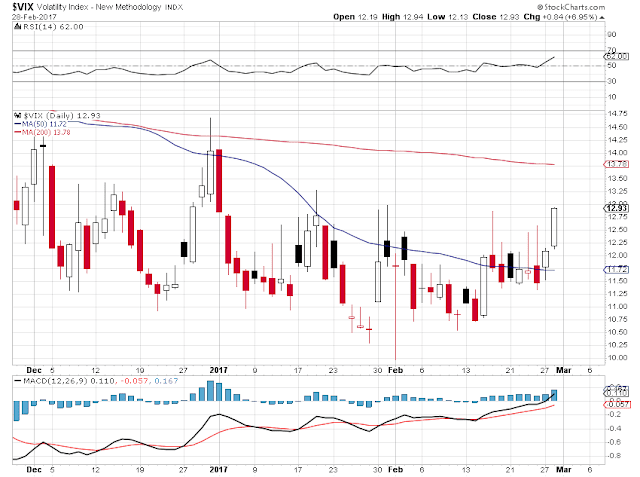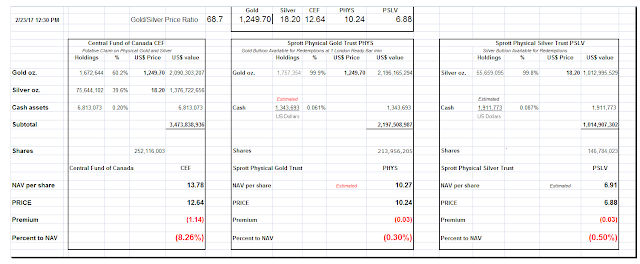The Fed's minutes came out today, and they were yet again mildly hawkish in that vague sort of way that has preceded twenty-nine of the last two actual rate increases.
There is a theory going about that because of the failure of the EU and alternatively China, the inflows of monies into dollar assets are bound to continue to drive the major stock indices higher, and will prompt the Fed to raise rates higher than many think.
This is a variant of the 'money on the sidelines' theory that, for whatever reasons, will be compelled to toss their wealth into overpriced assets because they have no other choice. For a free people, getting the public to act by coercion seems a familiar resort.
Now of course this is possible. The real question is, 'how probable.' And what sorts of things might we watch to determine if this particular scenario is genuinely falling into place.
Nothing in the markets is one dimensional. A Fed raising rates to try and stem a stock bubble fueled by a flight to safety from Europe or Asia is certainly a scenario, but there are a lot of other things that go along with it.
For example, what happens to the real economy and wage growth in the US as the Fed starts jacking up rates to try and halt an exogenously driven stock bubble? What other steps might the Fed and the regulators take? How does ever increasing inequality affect the mood of the voters?
To what extent will the market ignore expectations for US business performance and just run with the rallies with abandon?
I do not know. But one thing I am almost certain of is that no one else does either. And to the extent that they do know, they certainly are not telling the general public about it, or selling it to retail investors. There is a legitimate market for buying research on specific companies, no doubt. That is different than buying sweeping predictions from gurus.
The SNAP IPO should be coming out around the 2nd of March. As you know I would be waiting for some time around then if I were of a mind to take a bearish stance toward equities, barring any unforeseen events of consequence. But we have to be watchful regardless as the Trump administration is leaning towards rolling back what little protections the Banks had received.
I see some good things and bad things almost everywhere I look. We are seeing a lot of new construction in our corner of the world. Since I think this is one of those 'fortunate' areas of the US, I am not sure how heavily that weighs on my thinking about things overall.
But in addition to all this new, big time construction for commercial square footage, we are also seeing investment money buying up existing properties, and attempting to drive their rents higher.
So we are seeing quite a few long-established businesses folding up and moving along, because the rentiers are driving prices up against the market's ability to pay. And I am not talking about fly by night storefronts, but places that have been around for forty to sixty years, and weathered a lot of business cycles reasonably well. And not retail stores displaced by Amazon either.
Is this a 'creative destruction' or the ongoing malinvestment and distortions fueled by the Fed's top down approach to stimulating an economy caught in a very painful household balance sheet recession?
And of course, the current leadership in Washington is toying very seriously with the 'A' word. They are looking to cut back on 'entitlements' for people to help to finance more tax cuts and favours for the 'jobs creators.'
What happens when few have the surplus income to provide the broad buying demand for these new big jobs black boxes?
Recently the 'liberal establishment' economists, aka the minions of Hillary, have been circling the wagons around those care worn Clinton principles of governance; globalism, financialism, and corporatism, as an agenda taken forward by the combined powers of the military and the Banks.
Unfortunately, they have not yet realized fully that they are speaking to themselves and a small circle of those who believe that they have few other options.
The Council on Foreign Relations recently promoted an article in their house magazine Foreign Affairs that was subtitled,
'How Dissing the Experts is a Danger to Democracy.'
Yes, shame on you idiots. How dare you lose confidence in the professional class, the 'experts' who have been caught manufacturing conclusions for pay, and presenting unicorn myths as sound economic policy options?
Do you not have more respect for your betters?
Would you believe that a very similar point of view was promulgated by the Clinton Democrat's in the 1990's under the title,
Illiberal Democracy? The answer for those foreign countries who embraced their freedoms in the wrong way, regime change and colour revolutions were the prescriptions.
And so we might ask, what about now?
Have a pleasant evening.






































































